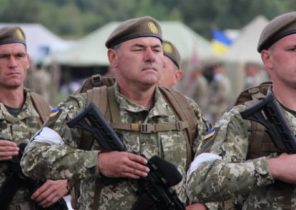Since July 2012, the world watched in horror as the once beautiful and bustling Syrian city of Aleppo becomes the field the ongoing battle. According to reports, during the years of civil war, the death toll in Aleppo and in all other regions of Syria, was about 300 thousand people.
According to one survey, during the war in Iraq, which was led by a coalition headed by the USA from 2003 to 2011, as a direct result of fighting or indirectly killed 405 of thousands of Iraqis. And 2001-2015 years as a result of the war in Afghanistan has killed 91 thousand 991 people. In total, the three countries over a 15-year period, the number of victims amounted to 796 thousand 991 people.
No matter how staggeringly large the number of people killed in these wars, it bears no comparison with the number of those killed during the battle of Stalingrad, which remains the most brutal and bloody battle in the world. According to rough estimates in this battle for six months, killing an incredible number of people — 1.9 million German and Soviet soldiers as well as civilians.
In June 1941, Hitler ordered the surprise invasion of the Soviet Union. Throughout the greater part of the following year the German army was pushing the Soviet troops, occupying thousands of square kilometers of territory of the USSR.
In August 1942 the German 6th army advanced to the banks of the Volga, being in close proximity to the industrial centre of the country. If successful, Germans could cut off the way to the Volga river and potentially to deprive Moscow of the opportunity to continue fighting. To do this they had to take even one city — Stalingrad.
Before the war the population of Stalingrad was 400 thousand people. Here was located the key river port, and numerous military and civilian enterprises, which had great importance. Since the city bore the name of the leader of the USSR Joseph Stalin, Hitler was particularly interested in the capture of the city, considering it a personal attack on the Soviet leader. And Stalin was considered a very important task to hold Stalingrad and not to give Hitler the opportunity to seize the city that bears his name.
Stalingrad was of great importance militarily, but given how it was important for Stalin and Hitler from a psychological point of view, its role has grown, and he may have been considered even more important than Moscow, the country’s capital. The price that both armies were willing to pay to take the city exceeded the costs reasonable from a military point of view. And this desire could be considered not only as obsession.
In the first stages of the battle for Stalingrad, the Germans quickly achieved considerable success. The Nazis attacked the city and its defenders, using aircraft, tanks, artillery, mortars and other heavy weapons, virtually unopposed. By early September 1942, the Germans continued to advance, but the rate of occurrence has decreased significantly.
The terrible mass bombing of the building of the city was turned into a ruin. The Soviet command began to devise defensive tactics of using the destroyed buildings, which, paradoxically, served as defenders of the city shelters.
However, by November the result of a strong offensive, German troops pushed the line of defense of the Soviet troops and reached the Volga. By the time the loss of the parties were hundreds of thousands of people, and the ferocity of the fighting on both sides of the front line was beyond humanity.
For fighting such concepts as good and evil, morality and honor no longer existed. The battle for Stalingrad became literally in an animal fighting for survival.
In the Hollywood film “enemy at the gates” (Enemy at the Gates, 2001) shows a duel between German and Russian snipers. For both sides, snipers have become one of the most feared opponents. Because they could shoot from a distance, the soldiers never felt safe and often fell under the bullets of snipers, even in those places which they considered safe.
One Russian sniper, Anatoly Chekhov, told about the time when he first time in my life shot a man: “I felt awful. I killed a man”. But after a while, learning about how the Germans killed many of his countrymen, in an interview during the battle of the Czechs said, “I began to shoot at him without pity. I became violent and wild, I kill them. I hate them.”
So you got the slightest idea about how the hell was the battle of Stalingrad, we offer you some of the stories told by people from both countries and reflecting their point of view.
In his excellent book “Stalingrad: how the Red army survived the onslaught of Germany” (Stalingrad: How the Red Army Survived the German Onslaught) Michael Jones (Michael Jones) recounts that on September 14, 1942, the Germans broke through the city to the Volga, before reaching his goal of 200 metres. The Soviets were on the verge of defeat.
Since the Luftwaffe had absolute air superiority, the deployment of reinforcements or resupply across the Volga in the daytime was almost suicidal. But as the commander of the 13th guards division was confident that, before nightfall, the Russian defenders, who occupied positions on the coast, will not last, he ordered his division to cross the river, considering what is at stake is the outcome of the battle and possibly the war.
General Alexander Rodimtsev put its troops on barges and with them began to cross the river. According to witnesses, the boat General have not yet managed to swim to the opposite shore, when she was hit by a German bomb. The majority of those who were on Board were killed, but the division commander miraculously survived. Most of his soldiers were not so lucky.
Albert burkovsky, one of the few Soviet defenders, even standing on the shore from the city, talked about how they approached the troops of the 13th guards division: “We were lying on the ground. Everything was on fire. The boats were bombed and shelled. I saw directly in front of me is sinking a large barge, full of soldiers in uniforms, grenades, sapper shovels, ammunition and machine guns.”
Similar horrible scene described by another defender of Stalingrad, Ivan Silaev. “The flames flared, the ferry was enveloped in black smoke, he heard an explosion, and just beyond that is a prolonged sharp sound, the ship maneuvered, then on the upper decks flared pillar of fire. A big explosion on the river went the waves. When it all ended and the smoke cleared, in the place where it was just the ship, there was nothing, just the waves. From what we saw, we have the blood froze in my veins”.
As noted by Michael Jones, the Soviet troops would not be able to hold the front line. “The Germans occupied the high Bank of the river and attacked the advancing Russians a devastating fire attack, he wrote. — It seemed that they will not be able to cross. But they did it. In a fierce melee soldiers Rodimtsev fought off the Germans in the main building and secured the crossing of the river.”
This fight is shown in a fragment from the Russian film “Stalingrad”, released in 2013. The view from the side, where the German troops were even worse.
In an interview with the historical portal WW2History.com surviving German soldier Helmut waltz (Helmut Walz) told me that during the street fighting in Stalingrad, the whole situation was so terrible, that the horror, he lost everything human. During the storm one of the buildings occupied by the Russians, the waltz was in the hottest phase and came face to face with an enemy soldier.
He tells how, tossing the gun to fire, suddenly “saw with the eyes of the stars. I looked to the right, held with the left hand face, and felt from under the hand gushing blood, and his mouth flew teeth.”
He thought, “That’s it, the end.” And waited to see what the Russian soldiers will kill him. But then he ran to the aid of one of his comrades and “smashed the head of the Russian who shot me. Despite the steel helmet which he was wearing, he hit him right in the face. He heard a crackling sound that I still hear it”.
But the horror for him the day is not over. While comrade bandaged Drum wound, he lifted his head and tried to warn a friend that the one behind is another Russian soldier. But it was too late.
Shots rang out, and he flew past the helmet that tore off his comrade. “Then I looked at him and saw that he was wounded in the head and his head split. When I first saw the human brain. On the left side and right side of the brain, and in the middle was water. Not blood, but water. He looked at me, stood on the ground with this wound.”
For six months, continued until the battle of Stalingrad, the cases like what happened with the soldiers of the 13th guards division and Helmut Walzem, repeated a thousand times.
In 21 years of military service I participated in combat operations of high intensity, as well as in counterinsurgency operations against the guerrillas. But, honestly, I can’t understand, can’t even really imagine what kind of hell was probably the battle of Stalingrad. Scary to think how ruthless and cruel people can become, deprived of all human.
The bloody battle of Stalingrad ended in February 1943, when the commander of the 6th army of the Wehrmacht General Friedrich Paulus (Friedrich Paulus) surrendered to Soviet troops together with the remaining 90 thousand soldiers of his army.
After the Red Army stopped the Nazis on the Volga, over the next two years will be ruthlessly persecute the Germans. The final phase of its triumphant March will be the fall of Berlin, death of Adolf Hitler and ending the war.
90 of the thousands of Germans caught in the Soviet captivity, survived and was able to see again his homeland less than six thousand, and they returned to Germany only in the middle of 1950-ies.
No matter how horrible and inhumane, in our opinion, was the war in the middle East in the last five years (and they were terrible, especially for the poor civilians caught between two fires), these wars are a mere shadow of past wars.
Let these shadows don’t come back.
Daniel Davis — a retired Colonel of the U.S. army. Several times was in business trips in Afghanistan. Senior researcher organizations Defense Priorities.







